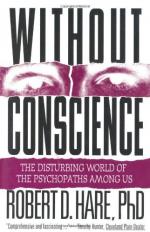
|
| Name: _________________________ | Period: ___________________ |
This quiz consists of 5 multiple choice and 5 short answer questions through Chapter 11, The Ethics of Labeling, pg 180-191.
Multiple Choice Questions
1. How are psychopathic children distinguished from normal kids?
(a) They are more difficult and harder to understand.
(b) They are overindulged by their parents.
(c) They are cuter and more likely to be spoiled.
(d) They are more intelligent.
2. How exactly does psychopathy correspond with troubled childhood?
(a) There is a 65% correspondence.
(b) There is 100% correspondence.
(c) There is no correspondence.
(d) There is 75% correspondence.
3. What characteristics make psychopaths unsuitable for dangerous jobs?
(a) Perfectionism and attention to detail.
(b) Adrenaline addiction.
(c) Fear and trepidation.
(d) Unpredictability and carelessness.
4. Why did Jack Abbott reject the word "remorse" in his case?
(a) Remorse is unhealthy.
(b) His victim was better off.
(c) Remorse is a waste of time.
(d) Remorse implies that you did something wrong.
5. When does the U.S. Supreme Court say expert testimony, such as Grigson's, is admissible?
(a) If the evidence is corroborated by facts from the defendant's life.
(b) If the evidence on which the opinion is based is made available.
(c) If the expert has appropriate credentials.
(d) If it is presented as opinion only.
Short Answer Questions
1. How do psychopaths know what emotions to display to others?
2. What is the "cycle of violence"?
3. What does a preschool psychopath understand about right and wrong?
4. How does the author describe the psychopath's typical lifestyle?
5. Why are nurturing women ideal prey for psychopaths?
|
This section contains 312 words (approx. 2 pages at 300 words per page) |

|




